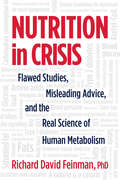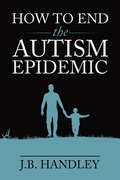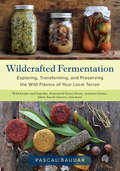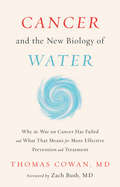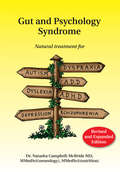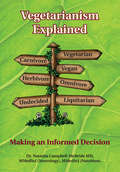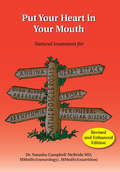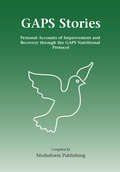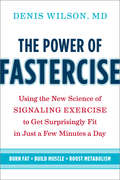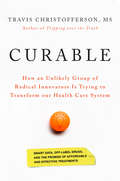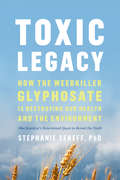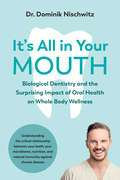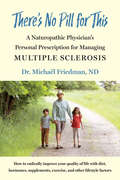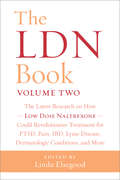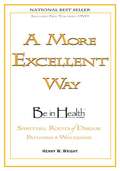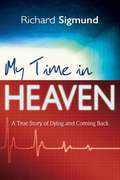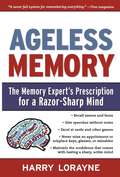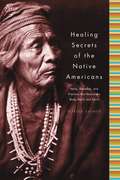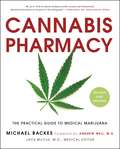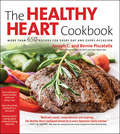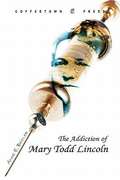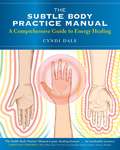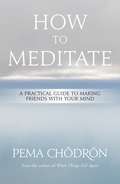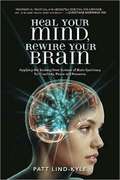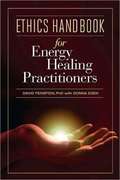- Table View
- List View
Nutrition in Crisis: Flawed Studies, Misleading Advice, and the Real Science of Human Metabolism
by Dr. Richard David FeinmanAlmost every day it seems a new study is published that shows you are at risk for diabetes, cardiovascular disease, or death due to something you’ve just eaten for lunch. Many of us no longer know what to eat or who to believe. In Nutrition in Crisis distinguished biochemist Richard Feinman, PhD, cuts through the noise, explaining the intricacies of nutrition and human metabolism in accessible terms. He lays out the tools you need to navigate the current confusion in medical literature and its increasingly bizarre reflection in the media. At the same time, Nutrition in Crisis offers an unsparing critique of the nutritional establishment, which continues to demonize fat and refute the benefits of low-carbohydrate and ketogenic diets—all despite decades of evidence to the contrary. Feinman tells the story of the first low-carbohydrate revolution fifteen years ago, how it began, what killed it, and why a second revolution is now reaching a fever pitch. He exposes the backhanded tactics of a regressive nutritional establishment that ignores good data and common sense, and highlights the innovative work of those researchers who have broken rank. Entertaining, informative, and irreverent, Feinman paints a broad picture of the nutrition world: the beauty of the underlying biochemistry; the embarrassing failures of the medical establishment; the preeminence of low-carbohydrate diets for weight loss, diabetes, other metabolic diseases, and even cancer; and what’s wrong with the constant reports that the foods we’ve been eating for centuries represent a threat rather than a source of pleasure.
How to End the Autism Epidemic: Revealing The Truth About Vaccines
by J. B. HandleyIn How to End the Autism Epidemic, Generation Rescue’s co-founder J.B. Handley offers a compelling, science-based explanation of what’s causing the autism epidemic, the lies that enable its perpetuation, and the steps we must take as parents and as a society in order to end it. While many parents have heard the rhetoric that vaccines are safe and effective and that the science is settled about the relationship between vaccines and autism, few realize that in the 1960s, American children received three vaccines compared to the thirty-eight they receive today. Or that when parents are told that the odds of an adverse reaction are “one in a million,” the odds are actually one in fifty. Or that in the 1980s, the rate of autism was one in ten thousand children. Today it’s one in thirty-six. Parents, educators, and social service professionals around the country are sounding an alarm that we are in the midst of a devastating public health crisis—one that corresponds in lockstep with an ever-growing vaccine schedule. Why do our public health officials refuse to investigate this properly—or even acknowledge it? In How to End the Autism Epidemic, Handley confronts and dismantles the most common lies about vaccines and autism. He then lays out, in detail, what the truth actually is: new published science links the aluminium adjuvant used in vaccines to immune activation events in the brains of infants, triggering autism; and there is a clear legal basis for the statement that vaccines cause autism, including previously undisclosed depositions of prominent autism scientists under oath. While Handley’s argument is unsparing, his position is ultimately moderate and constructive: we must continue to investigate the safety of vaccines, we must adopt a position of informed consent, and every individual vaccine must be considered on its own merits. This issue is far from settled. By refusing to engage with parents and other stakeholders in a meaningful way, our public health officials destroy the public trust and enable the suffering of countless children and families.
Wildcrafted Fermentation: Exploring, Transforming, and Preserving the Wild Flavors of Your Local Terroir
by Pascal BaudarWild krauts and kimchis, fermented forest brews, seawater brines, plant-based cheeses, and more One of the most influential tastemakers of our time invites you on an extraordinary culinary journey into the lacto-fermentation universe of common wild edibles. Used for thousands of years by different cultures all around the world, lacto-fermentation is the easiest, safest, and most delicious way to preserve food. And nature provides all the necessary ingredients: plants, salt, and the beneficial lactic acid bacteria found everywhere. In Wildcrafted Fermentation, Pascal Baudar describes in detail how to create rich, flavorful lacto-ferments at home from the wild and cultivated plants in your local landscape or garden. From sauerkrauts and kimchis to savory pastes, hot sauces, and dehydrated spice blends, Baudar includes more than 100 easy-to-follow, plant-based recipes to inspire even the most jaded palate. Step-by-step photos illustrate foraging, preparation, and fermentation techniques for both wild and cultivated plants that will change your relationship to the edible landscape and give you the confidence to succeed like a pro. So much more than a cookbook, Wildcrafted Fermentation offers a deeply rewarding way to reconnect with nature through the greens, stems, roots, berries, fruits, and seeds of your local terroir. Adventurous and creative, this cookbook will help you rewild your probiotic palate and “create a cuisine unique to you and your environment.”
Cancer and the New Biology of Water
by Dr. Thomas CowanWhy the War on Cancer Has Failed and What That Means for More Effective Prevention and Treatment A groundbreaking look at the role of water in living organisms that ultimately brings us closer to answering the riddle of the etiology of, and therapy and treatment for, cancer When President Nixon launched the War on Cancer with the signing of the National Cancer Act of 1971 and the allocation of billions of research dollars, it was amidst a flurry of promises that a cure was within reach. The research establishment was trumpeting the discovery of oncogenes, the genes that supposedly cause cancer. As soon as we identified them and treated cancer patients accordingly, cancer would become a thing of the past. Fifty years later it’s clear that the War on Cancer has failed—despite what the cancer industry wants us to believe. New diagnoses have continued to climb; one in three people in the United States can now expect to battle cancer during their lifetime. For the majority of common cancers, the search for oncogenes has not changed the treatment: We’re still treating with the same old triad of removing (surgery), burning out (radiation), or poisoning (chemotherapy). In Cancer and the New Biology of Water, Thomas Cowan, MD, argues that this failure was inevitable because the oncogene theory is incorrect—or at least incomplete—and based on a flawed concept of biology in which DNA controls our cellular function and therefore our health. Instead, Dr. Cowan tells us, the somatic mutations seen in cancer cells are the result of a cellular deterioration that has little to do with oncogenes, DNA, or even the nucleus. The root cause is metabolic dysfunction that deteriorates the structured water that forms the basis of cytoplasmic—and therefore, cellular—health. Despite mainstream medicine’s failure to bring an end to suffering or deliver on its promises, it remains illegal for physicians to prescribe anything other than the “standard of care” for their cancer patients—no matter how dangerous and ineffective that standard may be—and despite the fact that gentler, more effective, and more promising treatments exist. While Dr. Cowan acknowledges that all of these treatments need more research, Cancer and the New Biology of Water is an impassioned plea from a long-time physician that these promising treatments merit our attention and research dollars and that patients have the right to information, options, and medical freedom in matters of their own life and death.
Gut and Psychology Syndrome: Natural Treatment for Autism, Dyspraxia, A.D.D., Dyslexia, A.D.H.D., Depression, Schizophrenia, 2nd Edition
by Dr Natasha Campbell-McBrideDr. Natasha Campbell-McBride set up The Cambridge Nutrition Clinic in 1998. As a parent of a child diagnosed with learning disabilities, she is acutely aware of the difficulties facing other parents like her, and she has devoted much of her time to helping these families. She realized that nutrition played a critical role in helping children and adults to overcome their disabilities, and has pioneered the use of probiotics in this field. Her willingness to share her knowledge has resulted in her contributing to many publications, as well as presenting at numerous seminars and conferences on the subjects of learning disabilities and digestive disorders. Her book Gut and Psychology Syndrome captures her experience and knowledge, incorporating her most recent work. She believes that the link between learning disabilities, the food and drink that we take, and the condition of our digestive system is absolute, and the results of her work have supported her position on this subject. In her clinic, parents discuss all aspects of their child's condition, confident in the knowledge that they are not only talking to a professional but to a parent who has lived their experience. Her deep understanding of the challenges they face puts her advice in a class of its own.
Vegetarianism Explained: Making an Informed Decision
by Dr Natasha Campbell-McBrideAnother blockbuster from Dr. Natasha Campbell-McBride, the creator and author of the GAPS Protocol—Gut And Psychology / Gut And Physiology Syndrome. Her GAPS Nutritional Protocol has been used successfully by hundreds of thousands of people around the world for treating a plethora of chronic health problems, from mental illness to physical disorders. Her book Gut and Psychology Syndrome has been translated into sixteen languages. She has now undertaken an intense study into the value of plant foods versus animal foods. Vegetarianism Explained: Making an Informed Decision is the result of this study. Dr Campbell-McBride gives a full scientific description of how animal and plant foods are digested and used by the human body. This information will give the reader a good understanding on how to feed their body to achieve optimal health and vitality. This book is an essential read for those who are considering a plant-based lifestyle and those who are already following a vegetarian or a vegan diet. The subject of fasting is covered and will give the reader a good understanding on how to use this method for healing and health. This book will also answer questions on where our food comes from and how it is produced, how to eat in harmony with your body’s needs and how we should introduce small children to the world of food. Dr Natasha Campbell-McBride is known for her ability to explain complex scientific concepts in a language easily understood by all. Vegetarianism Explained will be enjoyed by all ages of adults – from young teenagers to mature professionals. For those who are scientifically minded the book is fully referenced.
Put Your Heart in Your Mouth: Natural Treatment for Atherosclerosis, Angina, Heart Attack, High Blood Pressure, Stroke, Arrhythmia, Peripheral Vascular Disease
by Dr Natasha Campbell-McBrideIf you stop any person on the street and ask them what causes heart disease, you know what their answer will be: butter and eggs, meat and fat. This infamous Diet-Heart Hypothesis was proposed in 1953, and it took scientists all over the world a few decades to prove it wrong. The trouble is that while science was beginning to cast doubt upon its basic tenets, the Diet-Heart Hypothesis was giving rise to a powerful and wealthy political and commercial machine with a vested interest in promoting it—by means of anti-fat and anti-cholesterol propaganda presented relentlessly and with increasing intensity. In this book Dr. Campbell-McBride tackles the subject of CHD (Coronary Heart Disease), caused by atherosclerosis, a disease of the arterial wall that leads to narrowing and obstruction of the arteries. She maintains that conventional medicine does not actually know the cause of atherosclerosis or how to cure it, and explores in this book what it is, what causes it, and how to prevent and reverse it. She dispels the myth of the Diet-Heart Hypothesis, and explains that cholesterol is not the enemy but an integral and important part of our cell membranes.
GAPS Stories: Personal Accounts of Improvement and Recovery Through the GAPS Nutritional Protocol
by Medinform PublishingDr. Natasha Campbell-McBride created the term GAPS (Gut and Psychology Syndrome or Gut and Physiology Syndrome) in 2004 to describe the plethora of health problems that stem from an unhealthy gut. Since developing the GAPS nutritional protocol, Dr. McBride has received letters from GAPS sufferers all over the world: stories written by real people who have overcome their real health problems. Every one of these people has learned valuable lessons on their healing journey: lessons they are keen to pass to others who may be struggling through the same difficulties. These stories can be utilized as case studies for how to progress through personal healing and how to deal with problems that one may have to face along the way. There is nothing more valuable than real life experience! Those who have lived through something, fought the battle and won, know what is true and what is false, what works and what doesn't. Many of these stories are humbling--the kinds of horrific problems that people have had to deal with are hard to imagine for the majority of us--yet told with humor and grace!
The Power of Fastercise: Using the New Science of Signaling Exercise to Get Surprisingly Fit in Just a Few Minutes a Day
by Denis WilsonA revolutionary program of short burst, high-intensity exercise that uses your body's signals to curb hunger as it burns fat and builds muscle Over the last 26 years, thyroid pioneer Denis Wilson, MD, has trained thousands of physicians on the crucial relationships between the thyroid system, metabolism, and body temperature. He’s heard patients recount their inability to get fit using conventional approaches, and he’s understood their frustration. Based on the latest medical research, Dr. Wilson has created fastercise, a revolutionary practice that uses brief, strategically timed bursts of exercise to cancel hunger pangs, allowing people to more easily stick to a healthy eating plan and shift their bodies toward becoming leaner, faster, smarter, stronger, and healthier. Fastercise holds the promise of vindicating and liberating many of those who have struggled to improve their fitness, enabling them to transform their lives and reach their full potential. By combining simple analogies and clear explanations of the physiology of the body’s energy pathways and response to food and exercise, Dr. Wilson reveals how conventional approaches to dieting and weight management can actually fight against the body’s priorities and lead to frustration and poor results. Fastercise is a time-efficient, convenient, and natural approach powerfully signals the body to burn fat and build muscle synergistically, leading to surprisingly beneficial and quick results. The Power of Fastercise explains how fastercise can help you: • Burn fat without going hungry • Build your mitochondria to burn more fat and provide greater energy • Stimulate muscle growth in just a few minutes a day • Shift your body composition to less fat and more muscle • Boost your body temperature and metabolic rate • Look and feel younger • Increase mental focus, learning, and productivity • Decrease insulin resistance • Decrease inflammation and improve immune function • Improve respiratory fitness and athletic performance • Get great results with any healthy diet, including low-carb and high-carb In this groundbreaking book, Dr. Wilson lays out simple, practical strategies for combining fastercise with smart eating choices. Fastercise can provide excellent results for a wide range of people: seasoned athletes, fitness enthusiasts, and even those who dislike exercising or have physical limitations. Whatever your fitness goals are, fastercise can help you achieve them.
Curable: How an Unlikely Group of Radical Innovators is Trying to Transform our Health Care System
by Travis ChristoffersonSmart metrics, slow thinking, off-label drugs, and a “Moneyball” prescription for fixing modern medicine--by the author of Tripping Over the Truth The United States is fast becoming the sickest nation in the Western world. Cancer rates continue to rise. There is an epidemic of chronic disease in children. Even with all the money and modern innovations in science, the country’s health care system is beyond broken. Clearly there is a glitch in the system. But what if the solution has been here all along, and we’ve just been too blind to see it? In Curable journalist and health care advocate Travis Christofferson looks at medicine through a magnifying glass and asks an important question: What if the roots of the current US health care crisis are psychological and systemic, perpetuated not just by corporate influence and the powers that be, but by you and me? It is now known that human perception is based on deeply entrenched patterns of irrational thought, which we attach ourselves to religiously. So how does this implicate the very scientific research and data that doctors rely on to successfully treat their patients? A page-turning inquiry into a “moneyball approach to medicine,” Curable explores the links between revolutionary baseball analytics; Nobel Prize–winning psychological research on confirmation bias; wildly successful maverick economic philosophy; the history of the radical mastectomy and the rise of the clinical trial; cutting edge treatments routinely overlooked by regulatory bodies; and outdated medical models that prioritize profit over prevention. As stark as things are, Christofferson asks us to see health care not as a toppling house of cards, but as a badly organized system that is inherently fixable. How do we fix it? First we must reframe the conflict between doctors’ intuition and statistical data. Then we must design better systems that can support doctors who are increasingly overwhelmed with the complexity of modern medicine. Curable outlines the future of medicine, detailing brilliant examples of new health care systems that prove we can do better. It turns out we have more control over our health (and happiness) than we think.
Toxic Legacy: How the Weedkiller Glyphosate Is Destroying Our Health and the Environment
by Stephanie Seneff"Toxic Legacy will stand shoulder to shoulder with Rachel Carson’s Silent Spring. [This is] unquestionably, one of the most important books of our time."—David Perlmutter, MD, #1 New York Times bestselling author of Grain Brain and Brain Wash "Urgent and eye-opening, the book serves as a loud-and-clear alarm."—The Boston Globe "A game-changer that we would be foolish to ignore."—Kirkus Reviews (starred) From an MIT scientist, mounting evidence that the active ingredient in the world’s most commonly used weedkiller is contributing to skyrocketing rates of chronic disease Glyphosate is the active ingredient in Roundup, the most commonly used weedkiller in the world. Nearly 300 million pounds of glyphosate-based herbicide are sprayed on farms—and food—every year. Agrochemical companies claim that glyphosate is safe for humans, animals, and the environment. But emerging scientific research on glyphosate’s deadly disruption of the gut microbiome, its crippling effect on protein synthesis, and its impact on the body’s ability to use and transport sulfur—not to mention several landmark legal cases— tells a very different story. In Toxic Legacy, senior research scientist Stephanie Seneff, PhD, delivers compelling evidence based on countless published, peer-reviewed studies—all in frank, illuminating, and always accessible language. Throughout Toxic Legacy readers will discover: The uniquely toxic nature of glyphosate How glyphosate disrupts the microbiome, leading to gut dysbiosis, autoimmunity, neurodegeneration, and more Why we’re seeing a rise in non-alcoholic fatty liver disease, infertility, depression, and anxiety Glyphosate’s role in soil degeneration, water contamination, and threats to wildlife and biodiversity Important nutritional guidance for conscientious consumers who want to avoid glyphosate-contaminated foods and improve their health As Rachel Carson did with DDT in the 1960’s, Stephanie Seneff sounds the alarm on glyphosate, giving you guidance on simple, powerful changes you can make right now and essential information you need to protect your health, your family’s health, and the planet on which we all depend.
It's All in Your Mouth: Biological Dentistry and the Surprising Impact of Oral Health on Whole Body Wellness
by Dominik NischwitzThe future of medicine—and the key to a healthier life—starts in your mouth American dentists are beginning to discover what some of their European counterparts have long understood: Many common chronic conditions—obesity, inflammation, stroke, diabetes, Alzheimer’s, heart disease, and cancer, among others—often have their origins in the mouth. In a groundbreaking new work, German dentist Dr. Dominik Nischwitz presents the principles of biological dentistry along with emerging scientific research on the mouth’s vital role in the body’s microbiome—a key to whole body wellness. Challenging conventional dental wisdom that views the teeth as separate from the rest of the body, and conventional dental practices that often cause more harm than good, It’s All in Your Mouth delivers: The latest research on the microbiome and the mouth Critical information on the dangers of root canals and amalgam fillings The important role of nutrition in oral health and hygiene A clarion call for a new approach to dentistry Sensible, holistic, and humane, It’s All in Your Mouth offers a necessary new approach to natural immunity to chronic disease and integrating dental hygiene into whole body health.
There's No Pill for This: A Naturopathic Physician's Personal Prescription for Managing Multiple Sclerosis
by Michaël FriedmanFrom a doctor living with MS: how to radically improve your quality of life with diet, hormones, supplements, exercise, and other lifestyle adjustments <P><P> Most of us take for granted the little things in life—like walking out to the mailbox, socializing with friends, or enjoying a mug of hot coffee. But what if each daily activity required intensive planning and effort? That’s what living with multiple sclerosis is like, and author Michaël Friedman knows this from first-hand experience. <P><P> Since his diagnosis of multiple sclerosis a decade ago, Dr. Friedman has been searching for a cure for the disease. After years of research, he realized that he had some of the answers right in his naturopathic medicine toolbox, and others, surprisingly, lay in the realm of conventional medicine. There’s No Pill for This tells his story and offers treatment advice and hope to those who suffer from MS. He does not promise a miracle cure but instead provides the personal prescriptions he follows that are delaying the disease process and radically improving his quality of life, including dietary measures and supplements to support a healthy microbiome and hormone therapies that can reduce neuroinflammation and possibly promote neurorestoration. Dr. Friedman presents a daily protocol for MS patients, including diet, supplement, detoxification, and hormone strategies; mindfulness therapy; physical therapy; and a wide range of beneficial lifestyle adjustments related to exercise, sleep routines, time management, stress management, and more. He also offers special advice for supporting healthy bladder and bowel function and improving oxygen supply. <P><P> In the book’s conclusion, Dr. Friedman reflects on what this complicated chronic disease has taught him, and continues to teach him, about the value of humility and about what is truly important in life.
The LDN Book: The Latest Research on How Low Dose Naltrexone Could Revolutionize Treatment for PTSD, Pain, IBD, Lyme Disease, Dermatologic Conditions, and More
by Linda ElsegoodA comprehensive examination of Low Dose Naltrexone—a little-known drug with big potential A drug that is simultaneously affordable, devoid of severe side effects, and applicable to a wide range of diseases is not often found in the modern pharmaceutical landscape. But as medical professionals and researchers alike continue to discover, Low Dose Naltrexone (LDN) boasts this remarkable combination. LDN, originally prescribed in higher doses as a treatment for opioid addiction, works by blocking opioid receptors, thereby stimulating the production of endorphins, mitigating the inflammatory process, and stabilizing the immune response. Prescribed off-label and administered in small daily doses, this generic drug has proven useful in treating many different ailments. Expanding on the information presented in The LDN Book, Volume 1—which showcased LDN’s efficacy in treating conditions such as lupus, thyroiditis, autism spectrum disorder, and chronic fatigue—Volume 2 highlights the latest clinical trials, case studies, and research on LDN. More than a dozen medical professionals explain how they are using LDN to help patients suffering from chronic pain, Parkinson’s disease, dermatologic conditions, traumatic brain injury, Lyme disease, and more. The LDN Book, Volume 2 is both a resource for practitioners, pharmacists, and patients, and a renewed call for further research on the healing potential of this generic drug.
A More Excellent Way: Be In Health
by Henry W. WrightThe root of psychological and biological disease is spiritual. Author Henry W. Wright not only equips the church with respect to defeating sickness, but he also demystifies it by showing, from God's perspective, why mankind has disease in the first place. A More Excellent Way is a valuable resource in assisting spiritual leaders, health-care professionals, and all individuals in understanding the spiritual dynamics behind diseases of the body, spirit, and soul.
My Time in Heaven: A True Story of Dying and Coming Back
by Richard SigmundIs there life after death? After a tragic accident, doctors pronounced Richard Sigmund legally dead. Eight hours later, God miraculously brought him back to life on the way to the morgue. During those hours, God allowed him to experience the glorious beauty, heavenly sounds, sweet aromas, and boundless joys of heaven that await every believer. Richard Sigmund provided a detailed description of Life in Heaven. The details included the lives of children, where people lived, what clothes people wore, the presence of Jesus, among other things. He incorporated Christian theology into his descriptions and extensively quoted Biblical passages and shorter Biblical writings. Beside describing Heaven, the author briefly visited and described Hell. He said that God returned him back to earth with a mission to tell the world what he saw. Finally, he presented people's real-life testimonies of salvation and healing connected to his experiences.
Ageless Memory: The Memory Expert's Prescription for a Razor-Sharp Mind
by Harry LorayneThe world's foremost memory expert?and mega-bestselling author?proves that memory CAN get better with age! Diet and exercise are great, but what good is a healthy body if you don't have the mental capabilities to go with it? Harry Lorayne, who is now 83 years old, has been honing and teaching his foolproof system for sharpening the mind, improving concentration, and attaining a truly "superpower" memory for more than 40 years. Ageless Memory is the culmination of this memory expert's life's work. Specifically geared to our needs as we age, his unique memory system can be put into practice immediately?for a better memory the very same day you open the book and start to read! Completely practical and easy to use, readers learn to:Recall names and faces, even years laterNever miss an appointment or misplace keys, glasses, valuables, etc. Give speeches without notes and learn foreign words and phrases easily Memorize long lists of items, quotations, long numbers, Bible verses, and all kinds of facts and figures Excel at cards and other games Regain (or maintain!) the confidence that comes with having a sharp, active mind.It's not necessary to accept poor or waning memory or "senior moments" as inevitable results of growing older? and Harry Lorayne proves it in Ageless Memory!
Healing Secrets of the Native Americans: Herbs, Remedies, and Practices That Restore the Body, Refresh the Mind, and Rebuild the Spirit
by Porter ShimerIn the tradition of Black Dog & Leventhal's successful Chinese Natural Cures, Healing Secrets of the Native Americans brings the age-old knowledge and trusted techniques of Native-American healing to a wider audience. From this clear, reliable, and beautifully packaged book, learn how Native Americans have used the bountiful gifts of nature to heal the mind, the body, and the spirit. Discover how the Native-American tradition uses plants and herbs, heat, movement and sound, visualization, and spirituality to heal dozens of everyday ailments and illnesses--from back pain to insect bites to flu and sore throat and much more. Broken into sections, the book covers such topics as "The Healing Spirit" (including dream therapy, spirituality, and prayer), "The Native American Spa" (healing with heat, massage, sound and movement, and nutrition), "The Native American Pharmacy" (including more than 40 herbs and plants, how to obtain them, and how to use them), plus remedies for more than 40 ailments from acne to wrinkles.
Cannabis Pharmacy: The Practical Guide to Medical Marijuana
by Michael Backes Andrew WeilEvidence-based information on using cannabis for ailments and conditions, plus a comprehensive guide to the most popular varietiesThe most comprehensive, easy-to-use book available on understanding and using medical marijuana There are currently 4.2 million medical cannabis patients in the United States, and there are 20 states plus the District of Columbia where medical cannabis is legal. As medical cannabis becomes an accepted herbal medicine, there is a demand for clear, easy-to-follow information for the layperson based on the latest sound medical and evidence-based research. Written by Michael Backes, a respected expert in the field, Cannabis Pharmacy begins with the history of medical marijuana and an explanation of how cannabis works with the body's own endocannabinoid system. Backes goes on to explore in detail 27 of the most popular cannabis varieties, how to identify them, the differences between them, and the medical conditions for which patients have reported effectiveness. Additional chapters describe how to prepare and store cannabis, how best to administer those preparations, and how to modify and control dosage. Also included is a guide to 29 ailments and illnesses for which doctors commonly recommend medical marijuana, including chronic pain, chemotherapy-induced nausea, multiple sclerosis, Alzheimer's disease, fibromyalgia, and Parkinson's disease. Meticulously researched and written in an easy and accessible style, Cannabis Pharmacy provides the clearest, most complete, and most practical information available on the use and benefits of medical marijuana.
Healthy Heart Cookbook: Over 700 Recipes for Every Day and Every Occassion
by Joseph C. Piscatella Bernie PiscatellaFor the millions of Americans living with heart disease, The Healthy Heart Cookbook provides hundreds of delicious and healthy recipes for all the family favorites, from hamburgers to pancakes!In The Healthy Heart Cookbook, Joe Piscatella, a heart patient himself, who has turned his life and health around by following a healthy diet, 700 of the BEST recipes from Joseph C. Piscatella's five cookbooks (which have more than 2,000,000 copies in print and are used by more than 5,500 hospitals). The 700 recipes--which range from Taco Pizza to Grilled Teriyaki Salmon to marinated flank steak and Chocolate Pudding--are quick-to-fix and delicious. Based on guidelines from the American Heart Association, each recipe includes nutritional breakdowns, and the 1000-plus-entry fat-gram counter for common foods makes healthy substitutions a breeze. Perfect for the whole family!
The Addiction of Mary Todd Lincoln
by Anne E. BeidlerMary Todd Lincoln, wife of the president we have immortalized, has always been difficult for us to understand. She could appear poised and brilliant one moment yet rude and ugly the next. Sometimes competent and strong, able to entertain dignitaries from around the world, at other times she appeared dependent and weak. At times she seemed utterly beside herself with sobbing and screaming. Historians have mostly avoided saying very much about Mary Todd Lincoln except in reference to her husband, Abraham. To many it would seem that Mary Todd Lincoln is still an embarrassment in the tragic story of her martyred husband. But Mary Todd Lincoln lived her own tragic story even before Abraham was murdered. She was an addict, addicted to the opiates she needed for her migraine headaches. Seeing Mary Todd Lincoln as an addict helps us understand her and give her the compassion and admiration she deserves. In her time there had been no courageous First Lady like Betty Ford to help people understand the power of addiction. There was no treatment center. In Mary Todd Lincoln's time there were many addicts at all levels of society, as there are now, but it was a more socially acceptable condition for men to have than for women. More importantly, addiction was not very well understood, and it was often mistreated. Because Mary Todd Lincoln's only surviving son, Robert Lincoln, made a great effort to protect his mother and his family from journalists and historians, he intentionally destroyed most of Mary Todd Lincoln's medical records and many of her letters. What he could not destroy, however, is the record of Mary Todd Lincoln's pain and the record of how she behaved while living with this pain. In The Addiction of Mary Todd Lincoln, we can see clearly, for the first time, what Mary Todd Lincoln had to live with and the courage it took for her to carry on.
The Subtle Body Practice Manual: A Comprehensive Guide To Energy Healing
by Cyndi DaleCyndi Dale's The Subtle Body has become the go-to reference guide for anyone who wants to learn about the many varieties of energy healing. With The Subtle Body Practice Manual, she offers an equally valuable resource: a practical instruction manual for putting energy healing into action. Filled with lucid information, step-by-step guidance, diagrams, and key insights, here is an expansive how-to manual that covers practices from a vast range of holistic healing and energy medicine traditions, including: The six core energy techniques that every healer should know • Energetic diagnosis practices to determine which kind of modality will be most effective for specific health issues • Setting strong and flexible energetic boundaries, with special guidance for those in the healing professions • Techniques for working with the subtle aspects of the body, emotions, and the subconscious mind • Dozens of practices for healing through the chakras, the meridians, chi, breathwork, auric fields, sacred geometry, acupressure, music, and much more As Cyndi Dale writes, all medicine is energy medicine—which is why subtle energy practices can be used to complement and enhance any approach to healing or self-care. Presented with Cyndi Dale's thorough scholarship and clear writing style, The Subtle Body Practice Manual provides professionals and laypersons alike with an indispensible resource on the many varieties and applications of energetic care—so you can begin using these powerful practices in your own life.
How To Meditate: A Practical Guide to Making Friends with Your Mind
by Pema Chödrön***How to Meditate Has Been Named One of Library Journal’s Best Books of 2013*** <p> <p> Pema Chodron is treasured around the world for her unique ability to transmit teachings and practices that bring peace, understanding, and compassion into our lives. With How to Meditate, the American-born Tibetan nun presents her first book exploring in depth what she considers the essentials for a lifelong practice. <p> When we look for a meditation teacher, we want someone who has an intimate knowledge of the path. That's why so many have turned to Pema Chödrön, whose gentle yet straightforward guidance has been a lifesaver for both first-time and experienced meditators. With How to Meditate, the American-born Tibetan Buddhist nun presents her first book that explores in-depth what she considers the essentials for an evolving practice that helps you live in a wholehearted way. <p> More and more people are beginning to recognize a profound inner longing for authenticity, connection, compassion, and aliveness. Meditation, Pema explains, gives us a golden key to address this yearning. This comprehensive guide shows readers how to honestly meet and openly relate with the mind to embrace the fullness of our experience as we discover: <p> •The basics of meditation, from getting settled and the six points of posture to working with your breath and cultivating an attitude of unconditional friendliness<br> •The Seven Delights-how moments of diffi culty can become doorways to awakening and love<br> •Shamatha (or calm abiding), the art of stabilizing the mind to remain present with whatever arises<br> •Thoughts and emotions as "sheer delight"-instead of obstacles-in meditation <p> Here is in indispensable book from the meditation teacher who remains a first choice for students the world over. <p> “Pema is one of our most beloved and helpful teachers—practical, compassionate, and wise. How to Meditate is a great way to take her teachings to heart and develop a meditation practice.” —Jack Kornfield, author of A Path with Heart and A Lamp in the Darkness <p> “This new book is a great compilation of meditation instruction which she has personal given to many of her students over the years. These instructions have brought so much help to others that it has made her one of the most loved and revered Buddhist teacher in this modern world. With a brilliant mind and an absolutely cheerful attitude toward life, she practices what she teaches. She is a great support and friend to thousands of readers, and I am very sure that this book will help many in their everyday lives, as she makes this genuine attempt to reach us all.” —Dzigar Kongtrul Rinpoche
Heal Your Mind, Rewire Your Brain: Applying the Exciting New Science of Brain Synchrony for Creativity, Peace and Presence
by Patt Lind-KyleBreakthroughs in the scientific understanding of how the brain works have shown us that our brains are constantly rewiring themselves in response to events in our lives. This handbook applies this new science in practical ways, by giving us a training program to re-pattern our behavior and thereby change the ways our brain is wired. It interrupts our suffering, sharpens our mental abilities and corrects our cognitive imbalances. As we learn these mental skills, the neural patterns of our brains begin to change and we literally reprogram the neural networks through which information and energy flows. If you've heard about neuroplasticity, epigenetics, psychoneuroimmunology and other scientific advances, but didn't know how you could apply these breakthroughs to improve your life, you will find Heal Your Mind, Rewire Your Brain a treasure trove of resources. It provides a clear, step-by-step program that shows you how to correct the imbalances of the stressed-out brain, and install a peaceful state of mind.
Ethics Handbook For Energy Healing Practitioners
by David FeinsteinEthical principles are far more than mere rules or regulations - they are maps for bringing out your best as a caregiver and healer. Responding to a lack of articulated or standardized ethical guidelines for energy healing practitioners, David Feinstein, PhD, and Donna Eden developed a professional curriculum that has become one of the country's most successful and effective energy medicine certification programs. Now, this comprehensive, case-oriented guide allows veterans of the field and newcomers alike to work through a wide range of ethical dilemmas before they arise, helping you to prevent professional errors that could hurt you, your clients, and your practice.
